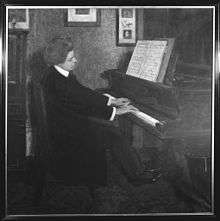Herbert Fryer

Herbert Fryer (21 May 1877 – 7 February 1957) was an English pianist, teacher and composer.
Career
George Herbert Fryer was born in Hampstead, London in 1877, the only son of three children.[1] His father George Henry Fryer was an insurance broker.[2] He was educated at Merchant Taylors' School, Northwood, then went on for two years study (1893–95) under Oscar Beringer[1] at the Royal Academy of Music (RAM).[3] In 1894 Fryer won the Heathcote Long Prize.[4] This was followed by four years study (1895–98) at the Royal College of Music (RCM), under Franklin Taylor.[1][3]
In 1898 Fryer had some lessons with Ferruccio Busoni in Weimar.[1] He also had some lesson with Tobias Matthay.[5] He made his London debut on 17 November 1898,[1] and then commenced a career as a touring recitalist as well as an examiner for the Associated Board of the Royal Schools of Music.[5] These tours took him all over Britain and Europe, and also to many parts of Canada, the United States,[6][7] Australia (including the goldfields of Western Australia)[8][9][10][11][12] South Africa, the Far East, and India.[1] He was also a competition adjudicator.[3] He was said to have travelled more than any other British pianist.[6] He gave 50 recitals in London alone, said to have been a record.[6] The King of Norway attended his recital in Christiania.[8]
He played at the Proms on six occasions from 1901 to 1918, playing such works as Mozart's Piano Concerto No. 24, Beethoven's Piano Concerto No. 3, Tchaikovsky's Piano Concerto No. 1 and Concert Fantasia, and Brahms' Piano Concerto No. 2.[13] No doubt his knowledge of the Brahms was informed by the fact that his teacher Oscar Beringer had given the British premiere of the work in 1882.[14][15]
In 1905 he took up a teaching position at the RAM, where he continued until 1914. His first tour of North America came in 1914. He stayed there for three years, teaching at the Institute of Musical Art in New York until 1917 (this later merged with the Juilliard School).[1][5]
On return to Britain in 1917, he was appointed Professor of Piano at the RCM, remaining in that post for the next 30 years, until 1947.[1][3] He was appointed a Fellow of the Royal College of Music in 1922. On retirement, he continued teaching privately above Bluthner's showrooms,[1] and died in London in 1957, aged 79.
Students
Herbert Fryer's students are his greatest legacy:[14]
- Trevor Barnard
- John Bishop, best known as founder of the Adelaide Festival[16]
- Richard Bonynge, conductor and husband of Dame Joan Sutherland[17]
- Lance Dossor
- Colin Horsley[18]
- Constant Lambert[19]
- George Malcolm[20]
- Anthony Milner[21]
- Cyril Smith
- Kendall Taylor
- also Alex Burnard (1900–1971),[22] Phillp Challis, John Clegg (b. 1928),[23] Phillip Gammon,[24] Leonard Isaacs,[25] John Kuchmy,[26] David Parkhouse (1930–1989),[27] Phyllis Schuldt,[28] and Glyn Townley (1911–2012).[29]
Recordings
Herbert Fryer made some recordings, both Welte-Mignon piano rolls and 78 rpm acoustic recordings for Vocalion.[1] These include:
- Beethoven: Minuet in E-flat[30]
- Chopin: Trois nouvelles études; Prelude from Op. 28
- Dvořák: Humoresque in G-flat[31]
- MacDowell: Sea Pieces, Op. 55, recorded 1909[32]
- Schumann: The Prophet Bird, from Op. 82
Compositions
His compositions are now little known. They include:
- Étude-Caprice, Op. 9, No. 1
- Suite for Piano, Op. 11
- Three Preludes, Op. 16[33]
- Three Preludes, Op. 17
- Morris Dance, Op. 18, No. 5
- The Virgin's Cradle-Hymn, Op. 20, No. 1[34]
- Five Transcriptions from Bach, Op. 22 (all from his Suites for solo cello):[35]
- Bourrée & Gigue from Suite No. 3 in C major, BWV 1009
- Sarabande from Suite for Suite No. 4 in E flat major, BWV 1010
- Sarabande & Gavotte from Suite No. 6 in D major, BWV 1012[36] (Jonathan Plowright has recorded the Sarabande;[37] his live performance of it at the Wigmore Hall on 15 November 2008 can be heard here on YouTube)
- piano arrangements of traditional Irish and English tunes[3]
He wrote Hints on Pianoforte Practice (published New York, 1914).[1]
Fritz Fryer (1944–2007), lead guitarist of the British pop group The Four Pennies, was his grandson.[38]
References
- 1 2 3 4 5 6 7 8 9 10 11 Bach Cantatas
- ↑ Unsung composers
- 1 2 3 4 5 Music Web International
- ↑ Unsung composers
- 1 2 3 Grove's Dictionary of Music and Musicians, 5th ed. (1954), Vol. III, p. 510: Fryer, (George) Herbert
- 1 2 3 The Mercury, 28 October 1920
- ↑ Daily Princetonian, 13 May 1916
- 1 2 Kalgoorlie Miner, 10 September 1920
- ↑ Kalgoorlie Miner, 29 September 1920
- ↑ The Register, Adelaide, 23 November 1920
- ↑ The Mercury, 1 November 1920
- ↑ The Mercury, 3 November 1920
- ↑ The Proms Archive
- 1 2 David C F Wright, A Lost Generation of Pianists?
- ↑ Grove's Dictionary of Music and Musicians, 5th ed. (1954), Vol. I, p. 644: Beringer, Oscar
- ↑ Australian Dictionary of Biography
- 1 2 Georg Solti Accademia
- ↑ The Gramophone, 7 August 2012
- ↑ Naxos
- ↑ baroque music.org
- ↑ chesternovello
- ↑ The Papers of Alex Burnard
- ↑ David M Cummings, International Who's who in Music and Musicians' Directory
- ↑ The Ballet Association
- ↑ The Canadian Encyclopedia
- ↑ The Canadian Encyclopedia
- ↑ The Parkhouse Award
- ↑ The Canadian Encyclopedia
- ↑ artsmart
- ↑ spencersrolls
- ↑ Video on YouTube
- ↑ Sea Pieces on YouTube
- ↑ Catalog of Copyright Entries: Musical compositions, Part 3
- ↑ IMSLP
- ↑ Hyperion Records
- ↑ Bach Cantatas
- ↑ Hyperion Records
- ↑ allmusic: Fritz Fryer